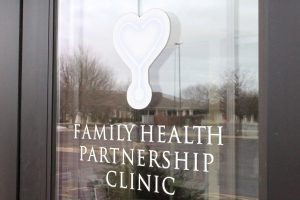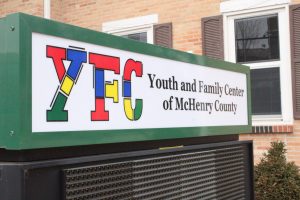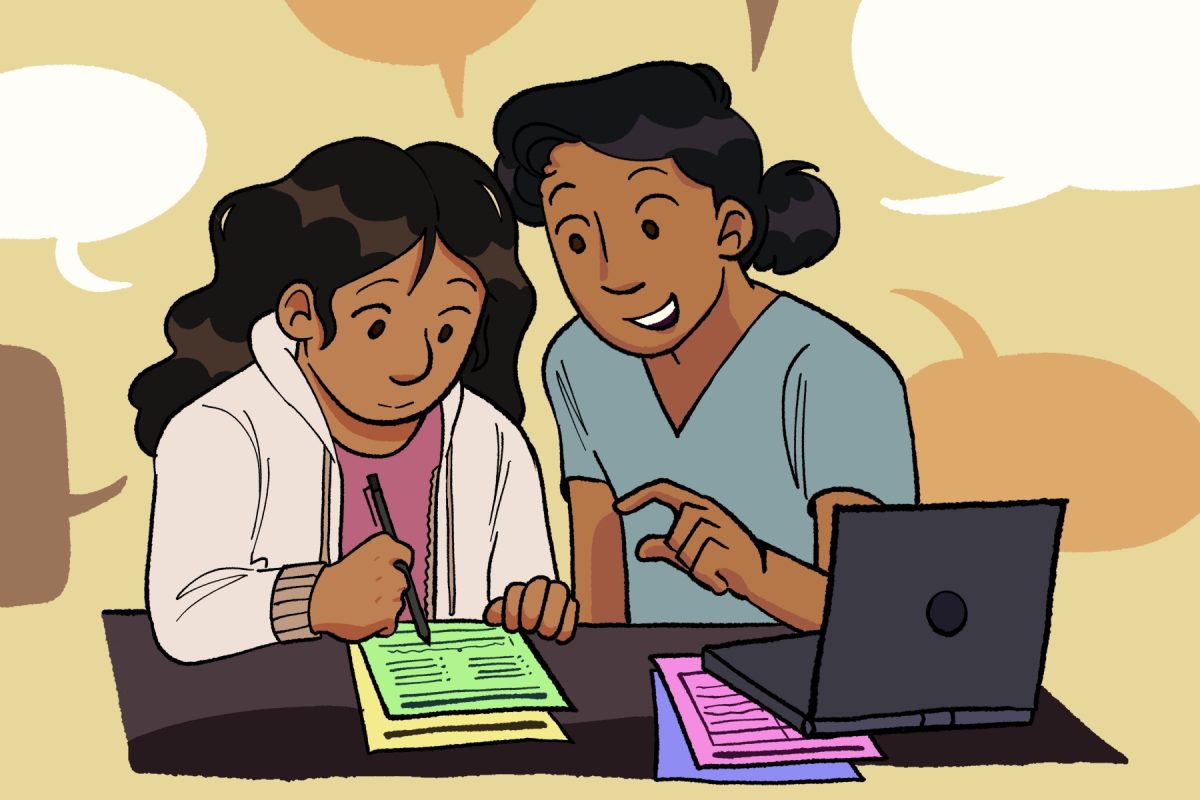Change can be difficult for a lot of people, whether that change is necessary or just happens. Moving to a new country, new school, new community, and meeting new people due to hardships can be an even more challenging form of change. There are so many unknowns, but sadly the risk of the unknown is better than what is current conditions of life.
Most immigrants that come to the United States are looking for a better life than what they had or want to give their children a better life even if it could come at a risk.
In the start of 2024, there was a drop-off of immigrants from the border along Texas to McHenry County, including Fox River Grove and Woodstock. Gov. Gregg Abbot sent these migrants from Texas where they crossed the U.S. border from Mexico, hoping to make a point to democratic mayors and governors that immigration has become a national emergency. These were people getting bussed to a new state in a country they may have never been to before, and most were unprepared for the cold weather.

According to Suzanne Hoban, an employee of the Family Heath Partnership Clinic in Crystal Lake that serves individuals that are uninsured, “The migrant drop offs have not yet affected us, as they are being sent back to Chicago to the ‘Landing Zone’ where they are better equipped to handle both the numbers as well as the legal issues surrounding seeking asylum.”
At MCHS, there has not been an out of the ordinary increase in students that have migrated or moved to the school since the drop-off of immigrants, but there was an increase in students to district 200, according to Carla Flores, a counselor at MCHS.
In order to be enrolled within a school, the student does not have to be a documented citizen of this country. The only requirement is that they have established residency within the district borders of the school and can provide the general information, such as contact and demographic information. The school does not keep track or ask for the students status, and it is all self-disclosed information when it reaches the counselors or employees of the school.
“We know from the students, self disclosure, and students seeking supports and resources,” said Flores. “Once we know kind of where someone’s at or what barriers they face based on their citizenship status, we’re able to support them and connect them to communities in that way. If you do not have a social security number or have other barriers, that would limit the access you have to financial aid.”
Students and families that face barriers with their status in the country or have recently immigrated are typically in need of support. The support can be in many different forms, but MCHS does their best to help the students. One of the ways the school provides support is through the social workers and counselors, and for students that do not speak or know English well there are bilingual social workers and counselors.
“I am the only bilingual social worker at McHenry,” said Otto Corzo, a social worker and former Spanish teacher of MCHS, “and I do my best to show up and provide them with the supports that they need “They do not often know that there is a bilingual social worker here, so they are some times leaning on the bilingual instructional assistants to kind of like guide them to get the supports.”
MCHS has bilingual instructional assistants to help a student learn the material that is occurring in school. The school has a multi-language program for this purpose, and students that get placed in this have to meet certain criteria.
“We have certain sections of classes that are part of the ML program,” said Flores. “There is ML instructional assistants that work with the teacher, and they are all certified to support students that do not speak English or have limited English abilities.”

For what the school can not support students with, they refer them to businesses or organizations that can help them. MCHS typically refers students and families that need support in ways that they can not provide to the Youth and Family Center, located in McHenry near the Freshman Campus.
“The youth and families center is really here to just provide equitable support to all members of our community here in McHenry County,” said Sebastian Morales, a social worker of the YFC. “Anyone who speaks English or may not speak English, who may be a legal resident or who may also be a person who is just here, or is undocumented, we believe that everyone should receive equitable services for those who live in the county.”
The YFC is a free organization for families that are in need. They help everyone and anyone that needs it and is from ages six to elderly. The only requirement is that the individual or family must live in McHenry County.
“We do everything from provide after school programming for our kids,” said Morales, “ages first grade through the end of high school, to helping support people with translating documents to connecting them with like, different resources in the community. We will help you through every step of the way. So if you come here looking for maybe food because you have food insecurity and you need to find like a food pantry, they will help you find the food pantry. If you have a really hard time at transportation and you do not know that you can call a pace bus, they will help you connect with those resources.”
The YFC is the main support system that immigrants or people in need are pointed to, but there are other organizations and businesses who work to help those in need too.
The Family Health Partnership Clinic works with adult immigrants, documented or undocumented, and people in need to provide a health care service that is free or very cheap compared to the typical cost for health care or medications. The requirement to have access to their services is that the person desiring to be a patient has to have no insurance at all. Then the clinic looks at their income and family size to determine what you may be able to pay towards the care that will be provided.
Much like the YFC, the Family Health Partnership Clinic accepts anyone and does not take their status in this country into account. They work to help those in need no matter what their status, undocumented or documented citizen, is.
“The clinic is a healthcare provider, not a branch of the Border Patrol,” said Hoban. “We believe that everyone deserves healthcare, and that by keeping people healthy, and we reduce the spread of disease. Many individuals who are undocumented work in cash jobs like restaurants. Do we really want someone with a respiratory infection making our salad?”
Most people that migrate here are unaware of these services that McHenry County has at first or at all, which can lead to them feeling on their own. By not having a support system to help them adjust or be able to get basic needs met they typically struggle.
There are a number of students at MCHS who are undocumented and may have migrated from Mexico and other countries, but that number is hard to determine because the school does not keep account for the students’ status within the country.
“We were on our own,” said an MCHS student whose family migrated from Mexico. She wished to remain anonymous to protect her family. “I remember my dad had to save up a lot of money because I stayed in Mexico while my mom has tried to come back here, but then she kept getting deported. So then she would try again and I would say she try like at least four times to get back due to her being undocumented. It was sad because I did not have a mom during that time.”
Families and individuals that come to McHenry County or the United States are almost always looking for a better life for themselves or their kids. The process of getting here or staying here can be challenging and long, but the risk and challenge is worth the chance of having a better life.
“Life was not ideal,” said Cassandra Martinez, a first generation U.S. citizen. “There is a lot of gangs and like violence so that is kind of a big reason we moved back here. We did it just to give us, me and my siblings, a better life. Just like any other family would do.”
A lot of the time when individuals and families move from another country, they do not speak English well or know the language. It can be hard to learn a language and adjust to a new country at the same time. Schools do the best that they can to accommodate and help students that are going through this, but it is still a challenge at first.
“I came back here and did not know any English at all,” said the anonymous MCHS student. “I do not think I fully learned it until fourth or fifth grade. I remember especially one moment where I was in art class. There was these people talking to me and I just could not understand it. I felt really dizzy because I was trying to understand what they were telling me. But I literally could not understand, so I felt like I did not belong here for the longest time.”
Even if a student is fluent in English, moving from another country can still be challenging in a school setting. In other countries there are different formats of how schools operate or look, so coming to any grade level of a new school can be overwhelming at first.
“In Mexico, it is very open, classes are outside. I went to a lot of schools in Mexico, so they were all different,” said Martinez. “It was really scary, but education is very different there. My brother who has autism, it is not severe, but he struggled learning. Here they have classes to assist with that. But in Mexico, no one gets like a special learning, so it is all kind of the same.”
Whether it is in an education setting or not, moving from another country is challenging. It takes a lot of time and energy to migrate to another country. Immigrants in McHenry County, documented or undocumented, are met with support and willingness to help them with what they need to have a better life.





